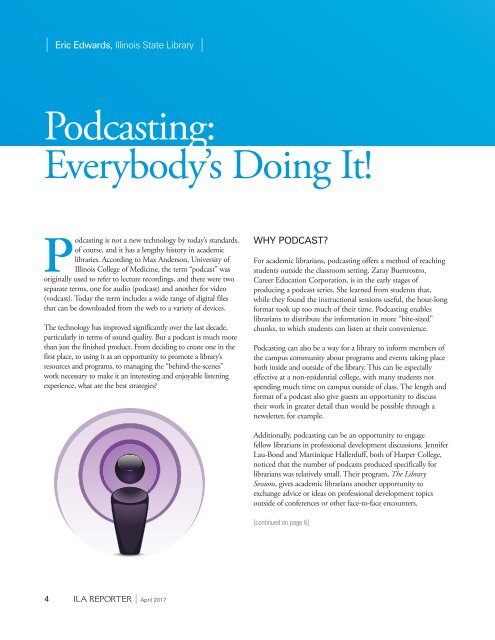I L L I N O I S L I B R A R Y A S S O C I A T I O N M
reporter_0417
reporter_0417
You also want an ePaper? Increase the reach of your titles
YUMPU automatically turns print PDFs into web optimized ePapers that Google loves.
| Eric Edwards, Illinois State Library |<br />
Podcasting:<br />
Everybody’s Doing It!<br />
Podcasting is not a new technology by today’s standards,<br />
of course, and it has a lengthy history in academic<br />
libraries. According to Max Anderson, University of<br />
Illinois College of Medicine, the term “podcast” was<br />
originally used to refer to lecture recordings, and there were two<br />
separate terms, one for audio (podcast) and another for video<br />
(vodcast). Today the term includes a wide range of digital files<br />
that can be downloaded from the web to a variety of devices.<br />
The technology has improved significantly over the last decade,<br />
particularly in terms of sound quality. But a podcast is much more<br />
than just the finished product. From deciding to create one in the<br />
first place, to using it as an opportunity to promote a library’s<br />
resources and programs, to managing the “behind-the-scenes”<br />
work necessary to make it an interesting and enjoyable listening<br />
experience, what are the best strategies?<br />
WHY PODCAST?<br />
For academic librarians, podcasting offers a method of reaching<br />
students outside the classroom setting. Zaray Buenrostro,<br />
Career Education Corporation, is in the early stages of<br />
producing a podcast series. She learned from students that,<br />
while they found the instructional sessions useful, the hour-long<br />
format took up too much of their time. Podcasting enables<br />
librarians to distribute the information in more “bite-sized”<br />
chunks, to which students can listen at their convenience.<br />
Podcasting can also be a way for a library to inform members of<br />
the campus community about programs and events taking place<br />
both inside and outside of the library. This can be especially<br />
effective at a non-residential college, with many students not<br />
spending much time on campus outside of class. The length and<br />
format of a podcast also give guests an opportunity to discuss<br />
their work in greater detail than would be possible through a<br />
newsletter, for example.<br />
Additionally, podcasting can be an opportunity to engage<br />
fellow librarians in professional development discussions. Jennifer<br />
Lau-Bond and Martinique Hallerduff, both of Harper College,<br />
noticed that the number of podcasts produced specifically for<br />
librarians was relatively small. Their program, The Library<br />
Sessions, gives academic librarians another opportunity to<br />
exchange advice or ideas on professional development topics<br />
outside of conferences or other face-to-face encounters.<br />
[continued on page 6]<br />
4 ILA REPORTER | April 2017


